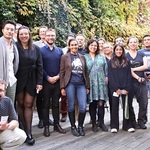
By Santiago Alarcón - foresteurope.org - 09th Nov 2022
Seasonal migration is one of the different forms of human migration that exist.
In this case the move happens each season or in response to labour or climate conditions. Why is seasonal migration of labour force a very important issue that needs urgent attention from relevant stakeholders? The EU is heavily dependent on a non-national labour force, either from other EU Member States or third world countries. Germany, Italy, Spain, France and Poland, for example, employ a high number of migrant seasonal farm workers. Bringing the issue closer home, Germany receives around 300,000 workers a year for agricultural, horticultural and forestry work, many of them from Central and Eastern Europe, especially Poland and Romania. But how many of these workers are specifically found in the forest sector? What roles do they play and how can these be distinguished from the agricultural sector? How are the working conditions? How can we make this issue more visible?

On 27th October 2022, 3 experts and 12 journalists from Austria, France, Germany, Greece, Romania, Serbia, Spain, and Sweden, met in Berlin with three objectives in mind, to: identify the challenges of seasonal forest migrants and the system around these challenges; evaluate the communicational and informative impact of the topic for the media in Europe, and build a network of trained journalists on seasonal migration, to be prepared and equipped for future disasters and information when needed. The workshop was organised by Forest Europe, International Union of Forest research Organizations (IUFRO) in collaboration with Migrapreneur and 2811. The challenges identified included: exposure to unethical recruitment practices creating the risk of bonded and forced labour; inadequate living conditions as well as limitations of movement; poor working conditions such as low wages, long working days, no rest periods; limited safety equipment and training; limited or no access to social protection or e.g. health care and risk of abuse and harassment. Other constraints include language barrier which might complicate access to information related to legislation and rights. Seasonal workers also face the challenge of lack of skills recognition and skills development opportunities.
One of the keynote speakers, a representative of the International Labour Organization (ILO) pointed out that ILO has four instruments in place to protect migrant workers, refugees, and displaced persons:
Migration for Employment Convention (Revised) (No.97), 1949
Migrant Workers (Supplementary Provisions) Convention (No.143), 1975
Migration for Employment Recommendation (Revised) (No. 86), 1949
Migrant Workers Recommendation (No. 151), 1975
In their recently published Policy Brief on just transition, ILO also calls for forest workers to be equipped with the right skills and access to meaningful and high-quality training and skills upgrading and the promotion of indigenous peoples’ knowledge and practices. The speaker from the International Union of Forest Research Organizations (IUFRO) also reiterated the need for inclusivity in forest education to cater for different groups, which was one of the recommendations from the recently launched Global Assessment of Forest Education Report, 2022. This is the first ever assessment on forest education at a global scale covering all education levels from primary schools up to universities and colleges. The project was a joint effort of three main partners (FAO; IUFRO and ITTO) and nine regional partners.
One of the experts at the workshop Dr. Jörg Schweinle from Thünen Institute lauded the workshop for the fruitful discussions “I hope that journalists will pick up the topic and bring it to the attention of the public. I have new research ideas and ideas on how to obtain empirical data which is a challenging but exciting task.”
Srividya Kalyanaraman, a Freelance Journalist from Belgrade, Serbia had the following remarks “The workshop took place at an important time, it opened my eyes and learn from the best minds, and I have many questions that I need to find answers to.”
It is without a doubt that forests and the forest sector play a key role for a just transition and climate change mitigation. As such, seasonal migrants can contribute to solving the problem of shortage of forest workers and replace the ageing forest sector workforce. But forest work needs to be decent because this is an important criterion that distinguishes Green Jobs from other jobs and as defined by Forest Europe in the Green Forest Jobs in the Pan-European Region report by the Thünen Institute. To increase visibility of the issue, we need to ensure that there is sufficient coverage from the media. Case studies on seasonal migration from countries that recruit seasonal workers can also be a good starting point as we try to obtain figures on the number of seasonal workers and the role they play.
For more information about Green Jobs and Forest Education, please contact This email address is being protected from spambots. You need JavaScript enabled to view it. and This email address is being protected from spambots. You need JavaScript enabled to view it.



